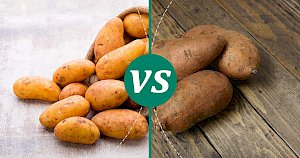Yam vs Russet Potato: Nutrition, Calories & Protein Compared


Yam vs Russet potato
Nutrition Facts
Serving size:
change
5g10g15g20g30g40g50g60g80g100g120g140g160g180g200g220g250g300g350g400g450g500g600g700g800g900g1000g
1oz2oz3oz4oz5oz6oz7oz8oz10oz12oz15oz20oz25oz30oz35oz40oz50oz
Amount Per Serving:
Serving size:
change
5g10g15g20g30g40g50g60g80g100g120g140g160g180g200g220g250g300g350g400g450g500g600g700g800g900g1000g
1oz2oz3oz4oz5oz6oz7oz8oz10oz12oz15oz20oz25oz30oz35oz40oz50oz
Amount Per Serving:
Yam vs Russet Potato 100g Compare
| per 100g | Yam | Russet potato |
|---|---|---|
| Calories | 118 | 95 |
| Carbohydrates | 27.88 g | 21.44 g |
| Fat | 0.17 g | 0.13 g |
| Dietary fiber | 4.1 g | 2.3 g |
| Protein | 1.53 g | 2.63 g |
| Water | 69.6 g | 74.45 g |
| Calcium | 17 mg | 18 mg |
| Iron | 0.54 mg | 1.07 mg |
| Magnessium | 21 mg | 30 mg |
| Potassium | 816 mg | 550 mg |
| Sodium | 9 mg | 14 mg |
| Vitaminium A | 138 µg | 10 µg |
| Vitaminium B1 (Thiamine) | 0.112 mg | 0.067 mg |
| Vitaminium B2 (riboflavin) | 0.032 mg | 0.048 mg |
| Vitaminium B3 (Niacin) | 0.552 mg | 1.348 mg |
| Vitaminium B6 | 0.293 mg | 0.354 mg |
| Vitaminium B9 (Folic acid) | 0.023 mg | 0.026 mg |
| Vitaminium C | 17.1 mg | 8.3 mg |
| Vitaminium E | 0.35 mg | 0.07 mg |
| Vitaminium K | 0.002 µg | 0.002 µg |
When it comes to root vegetables, yams and Russet potatoes are two staples in many diets around the world. Each brings its unique flavors, textures, and nutritional profiles to the table, making them versatile ingredients in a myriad of dishes. But beyond their culinary uses, these vegetables have interesting backgrounds and health benefits that might surprise you. Let’s delve into the world of yams and Russet potatoes, comparing their nutritional content, health benefits, and culinary uses to help you decide which might be the best fit for your next meal.
Did You Know These Facts?
Before we dive into the comparison, here are some fascinating facts about yams and Russet potatoes that might pique your interest:
- Yams are not just one type of vegetable but refer to the tubers of several different species in the genus Dioscorea. They are a staple food in Africa, Asia, and the Caribbean.
- Russet potatoes, also known as Idaho potatoes in the United States, are a type of potato known for their large size, thick skin, and fluffy texture when cooked. They are the go-to potato for baking and making French fries.
Nutritional Content: A Closer Look
At first glance, yams and Russet potatoes offer similar nutritional benefits, including being low in fat and cholesterol-free. However, when you look closely, there are some differences worth noting:
- Calories and Carbohydrates: Yams have slightly more calories and carbohydrates per serving than Russet potatoes.
- Fiber: Yams take the lead in fiber content, offering more than double the amount found in Russet potatoes. This is beneficial for digestive health and may help with blood sugar control.
- Protein: Russet potatoes have a higher protein content, although both are relatively low in this nutrient.
- Vitamins and Minerals: Both yams and Russet potatoes are good sources of vitamins and minerals, but yams are particularly high in vitamin C and beta-carotene, which the body converts into vitamin A. Russet potatoes, on the other hand, offer more vitamin B3 and iron.
It's clear that both yams and Russet potatoes have their own set of nutritional benefits, making them valuable additions to a balanced diet.
Health Benefits Galore
The nutritional content of yams and Russet potatoes translates into several health benefits. The fiber in yams can improve digestive health and may contribute to a feeling of fullness, aiding in weight management. The vitamin A in yams, thanks to their beta-carotene content, is crucial for eye health and immune function.
Russet potatoes are not to be outdone. Their higher protein content can be beneficial for muscle repair and growth. The iron in Russet potatoes is vital for healthy blood, while their vitamin B3 supports metabolism and nervous system health.
Culinary Uses: Versatility at Its Best
Both yams and Russet potatoes shine in the kitchen with their versatility. Yams can be boiled, baked, fried, or roasted and are often used in soups, stews, and even desserts. Their sweetness pairs well with spices, making them a favorite in many cultural dishes.
Russet potatoes are the ideal choice for baking, mashing, and frying due to their fluffy texture. They absorb flavors well, making them a perfect canvas for a variety of seasonings and toppings.
In conclusion, whether you choose yams or Russet potatoes, you’re making a nutritious and delicious choice. Each has its unique set of benefits and uses in the kitchen, so why not include both in your diet? Experiment with different recipes and enjoy the rich flavors and health benefits these root vegetables have to offer.
Yam 100g
118kcalCalories source
- 94% CARBS.
- 5% PROTEIN
- 1% FAT
Russet potato 100g
95kcalCalories source
- 88% CARBS
- 11% PROTEIN
- 1% FAT
Compares of yam
- Yam vs Asparagus
- Yam vs Beetroot
- Yam vs Broccoli
- Yam vs Butternut Squash
- Yam vs Cabbage
- Yam vs Carrot
- see all compares of yam
Marcin Piotrowicz
calories-info.com creator
Healthy diet and healthy lifestyle promoter
Add comment